How To Choose The Right Bathtub Drain Stopper?
There are a few crucial considerations when choosing a bathtub drain stopper: price, ease of installation, and maintenance requirements.
A lift-and-turn or push-and-pull type stopper is a good option if you want something sturdy and simple to install. If you intend to change your stoppers, you may typically switch out one type for another. For example, converting a lift-and-turn to a push-and-pull would be simple.
Some people find them more convenient because you can open and close the toe-touch stoppers without leaning over. Additionally, confirm that the stopper you choose fits your drain. For example, if your drain has an integrated strainer, a flip-it one won’t fit. You can find some of the best available options at hofen sanitary.
9 Most Common Types Of Bathtub Drain Stoppers
| Types | Pros | Cons |
| Lift-and-Turn | Durable and inexpensive | It can be tricky to remove |
| Push-and-Pull | Durable and cheap | It can be tricky to remove |
| Toe-Touch | Easy to use without bending over | Spring will wear out with time |
| Flip-It | Inexpensive and easy to install | O-rings will wear out with time |
| Trip-Lever | Easy to operate, good for back patients | Installation and maintenance can be hard |
| Pop-Up | There is no need to bend down to reach it
|
The installation process can be tricky. |
| Removable Drain Stopper | Easy to install and remove | It may not fit all drains |
Push and Pull
With a knob above a cap covering the drain, the push-and-pull stopper has a straightforward design. A light push will open the stopper, and a light pull on the knob will close it.
A push and stopper is quite simple to install. A set screw located beneath the stopper’s cap attaches the stopper’s body to the drain. For simple do-it-yourself projects, many drain stopper manufacturers include a manual.
These stoppers don’t wear out from frequent opening and closing; instead, they last very long.
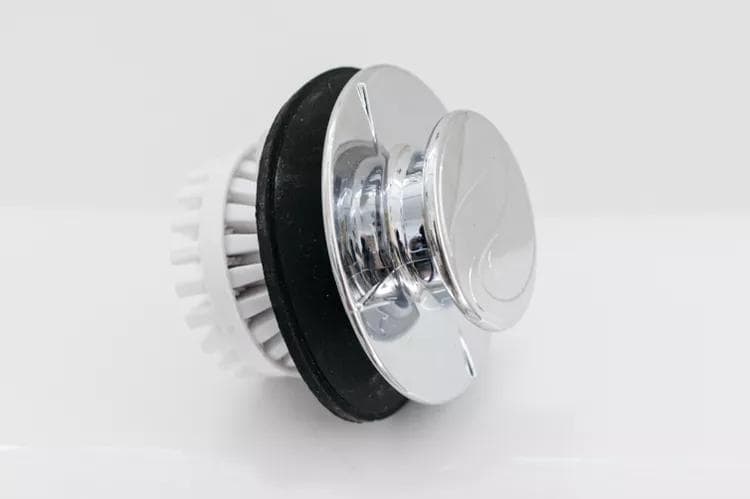
Lift and Turn
These are designed similarly to pull and push stoppers. The only distinction is that you have to pull on the knob and then swivel it to open this stopper. You only need to turn the knob in the other direction to close it.
Similar to push-and-pull stoppers, these also require assembly: a set screw beneath the knob needs to be tightened to the drain.
These stoppers fit the majority of bathtubs and are reasonably priced. They also require little to no upkeep.
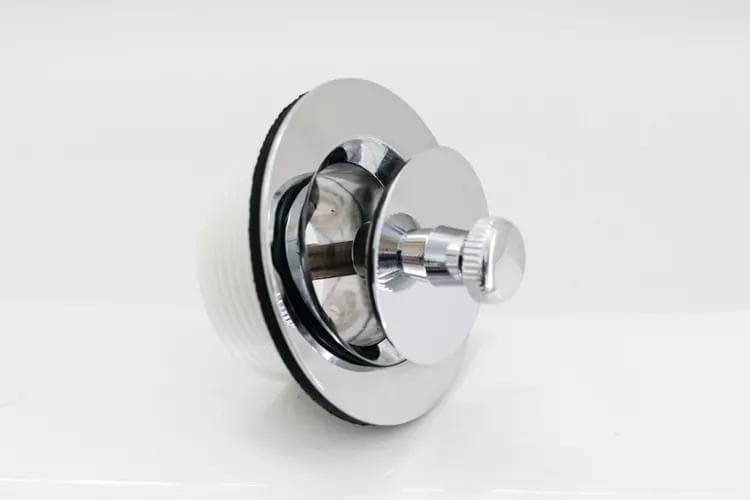
Toe Touch
These stoppers resemble push-and-pull stoppers, also known as toe-tap or foot-actuated drain stoppers.
In terms of design, they differ somewhat, though. The stopper body of these spring-loaded devices is fastened to the drain’s crossbar.
This stopper opens and closes with a simple toe tap; no bending is required. They are very affordable and very simple to replace and maintain.
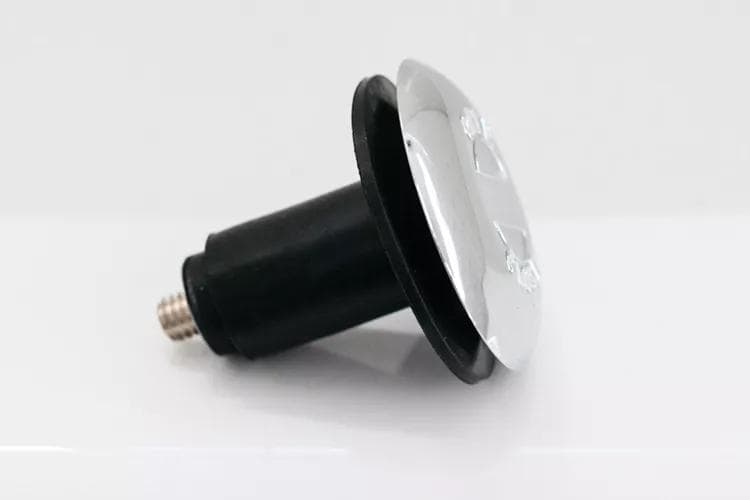
Pop up
Are you familiar with the tiny pop-up stoppers found in bathroom sinks? Now, picture the same scenario with your bathtub drain. They are operated on the overflow plate by this lever device. The stopper pops up or down when you move the lever, which causes a connecting rod to react and move.
Although these stoppers are inexpensive, maintaining them and installing them might be a bit of a pain. You must remove the stopper and the rocker’s arm through the drain and then wiggle the connecting rod out through the overflow pipe to clean them.
They also tend to catch hair and muck, which nobody likes because of all the moving parts. So, while they’re handy, they’re not maintenance-free.
Trip-Lever
The drain does not appear to have a pop-up stopper to open or close these intricate bathtub drain stopper kinds. The overflow pipe has a plunger that slides up and down to open and close the drain.
However, it isn’t easy to keep these bathtub stoppers clean. The assembly must be removed from the overflow plate and tube.
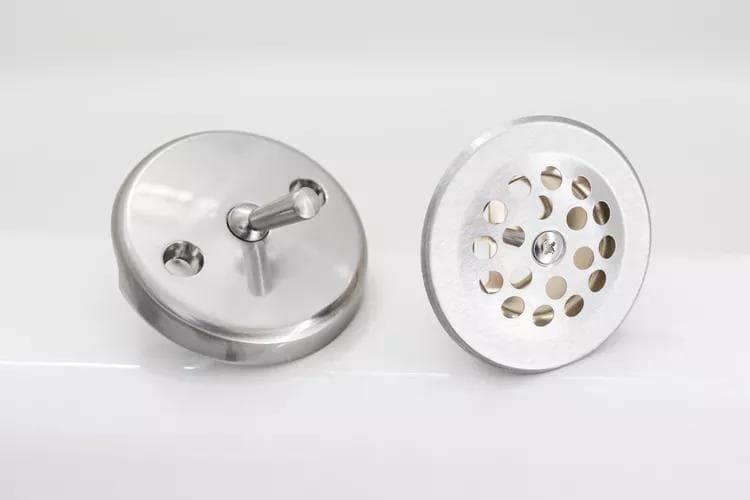
Removable Bathtub Drain Stoppers
Removable drain stoppers come in a variety of styles. A New York-based drain stopper business produces two varieties of StopShroom and StopShroom Plugs. You may install and remove any tools yourself without needing any tools.
The majority of sinks and tubs with drains up to 2 inches wide, the standard StopShroom is ideal. Drains up to 4 inches wide can be covered by the StopShroom model. They’re affordable and really simple to use.
Only a few colors—white, black, blue, and green—are available for them. Therefore, even while they’re helpful, they might not go with everyone’s bathroom style.
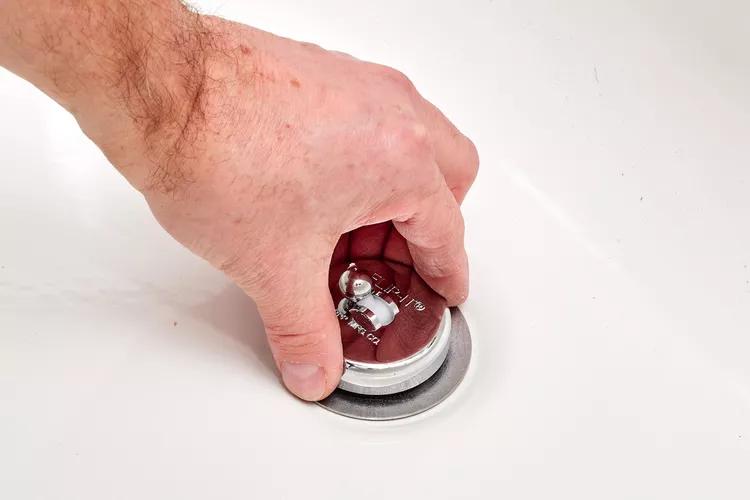
Flip It
The flip-it drain stopper has this lever on top that you flip side to side to open and close the drain. Underneath, there are these rubber rings that make sure no water passes through when it’s closed.
These stoppers are cheap, and you don’t need installation tools. Maintenance-wise, they’re a relief, but those rubber rings might eventually wear out and need swapping.
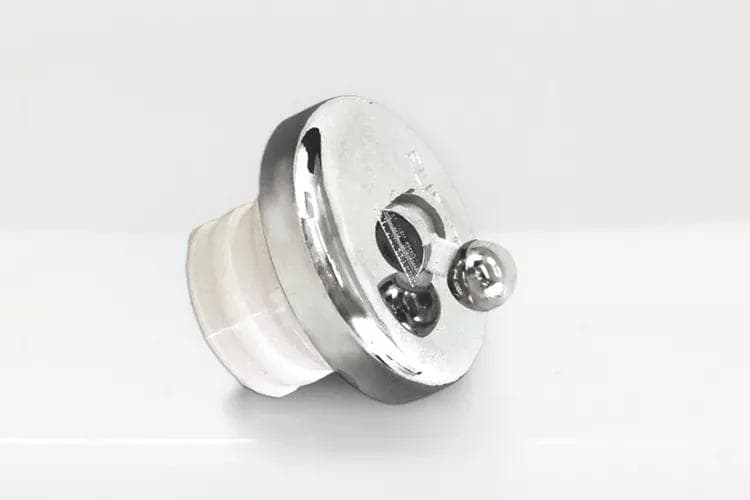
What’s the right way to Measure for a New Bathtub Drain Stopper
You must choose the right bathtub drain stopper size because they are available in different sizes. Most bathroom drains have a 1.5 to 2 inches diameter, yet this is not a universal measurement.
Measure the length of the plunger on the stopper with a measuring tape or ruler to determine the size you need. Alternately, remove the drain cover and measure the tub’s opening.
If everything else fails, find your bathtub’s brand online or call them to find out the specs.
Final Thoughts
This was all from my side! I hope this guide helped you understand the differences between bathtub drain stoppers. If you still have any questions, feel free to comment below.

